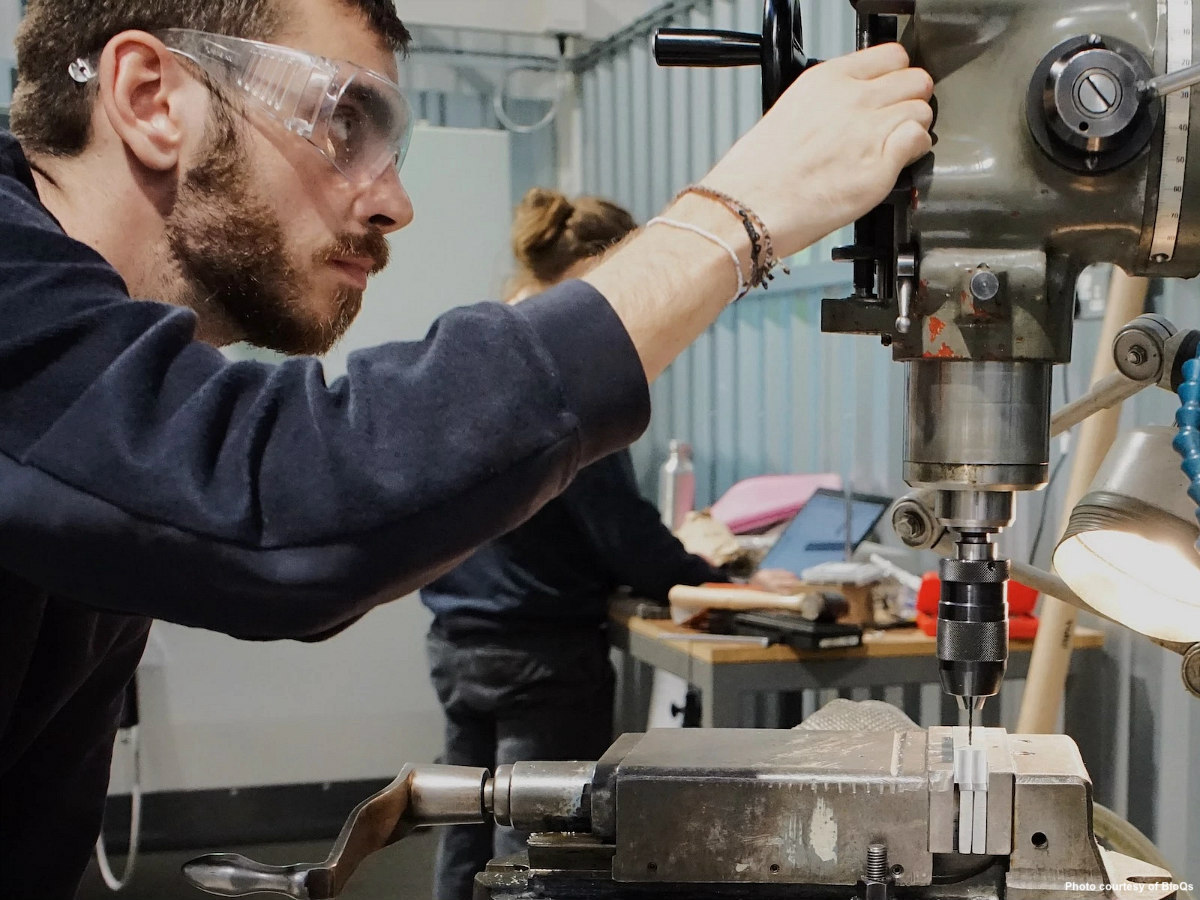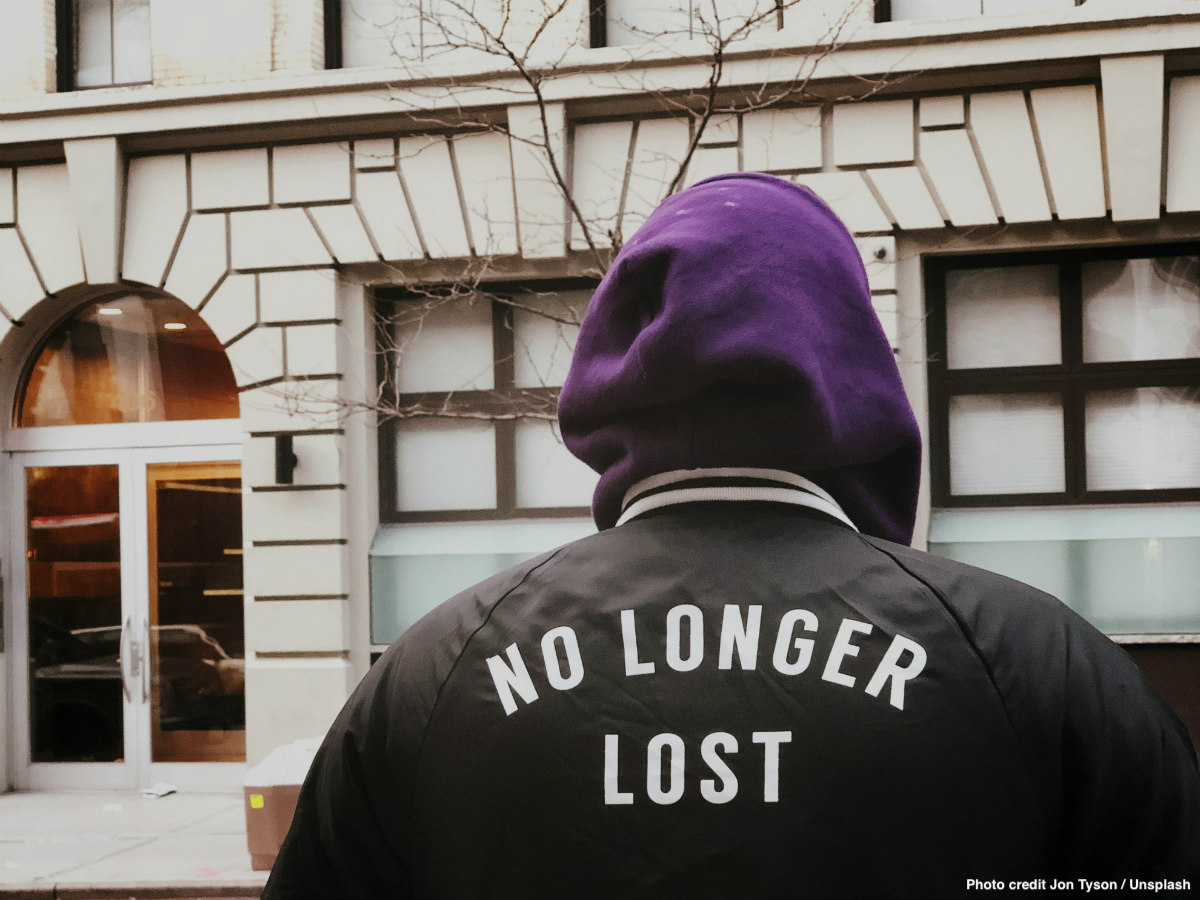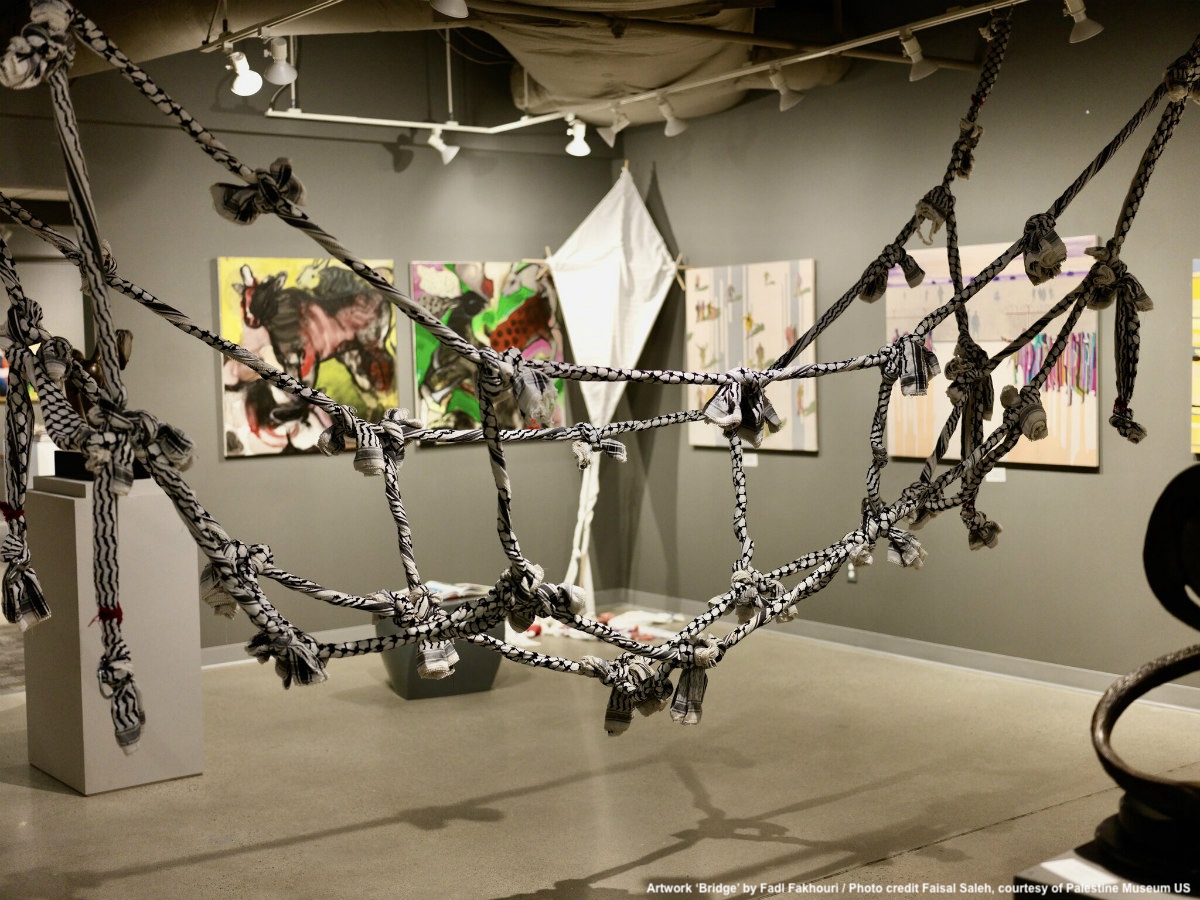I arrive at the Zoom call with Alejandro Parra a couple of minutes early, he is grabbing a coffee to join soon. It is a bank holiday around Europe, Good Friday for Parra in London. He has salt-and-pepper hair, and greets me with a smiley face. “I’m glad we got to do this,” he says. I am excited, too, that I can finally ask one of the co-founders of Bloqs, a unique “open-access factory” in North London, a pressing question: should manufacturing be part of our urban lives?
Setting up this chat took a little preparation. I approached Parra March last year without success. One year later his reply surprisingly popped up in my inbox. He tells me they were in the middle of moving Bloqs from one site to the new home while making sure that all machines were in operation for their members.
Bloqs is located in Enfield, whose council was reluctant to turn public land into flats owned by overseas investors – and instead chose to boost the local economy in one of London’s most ambitious urban regeneration projects. “Our focus has been pretty much to get us into a proper home,” says Parra “six years on from securing funding that is achieved and our focus now is on speaking to the wider world.”
I begin by asking about his background. Of a Chilean father and an English mother, he says he is a Londoner first and foremost. He studied English literature and worked for the service sector in restaurants, but to his surprise he ended up founding Bloqs with two of his co-founders, Arnaud Nichols and Avninder Nanray, who are makers and creators. His interest is in using his communication skills to build the Bloqs community.
Our purpose is to democratise the access for the maker to the best resources to make a living. We aim at dissolving the barriers between technology and the creative mind to tap innovation.
When I ask about the label “makerspace” Parra explains that he’s not comfortable with the term. “Like ‘makerspaces’ we provide access to resources to a wide community, but we don’t feel at home being describe as ‘a makerspace’ because we’re less about craft and hobby skills and more about manufacturing but when I shy away from the term some people think that I’m rejecting the movement, which I don’t in any way. We celebrate all making and creativity, but our purpose is to focus on people making a living which ‘makerspace’ doesn’t necessarily.”
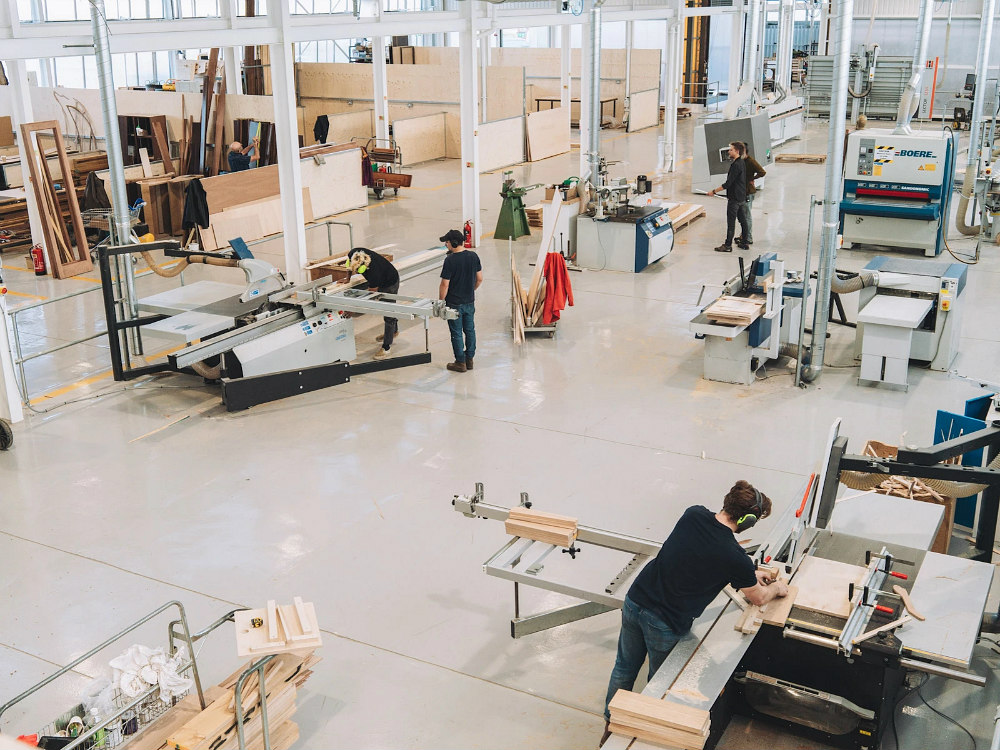
I also haven’t found out any other precedents I can draw on. Bloqs is like the shared Make-To-Order factory incarnate, a large spacious building with light industrial machines, the planning for an effective operation and the specialisation of professional makers to optimise the production processes they develop. The machinery in this workspace can be booked for a day, a week or as long as people need it. Bloqs describes itself as an “open-access factory” but, Parra argues, they use the term “open-access” in a much broader sense and factory sounds perhaps beyond human, although this component is at the heart of the project.
“Our purpose is to democratise the access for the maker to the best resources to make a living. We aim at dissolving the barriers between technology and the creative mind to tap innovation,” says Parra. There is a mixture of digital and analogue machinery, which accommodates people from traditions less familiar with digital technology but “we have a firm understanding of both to provide a balance between manufacturing and technical innovation.” This approach contrasts with the division of labour and innovation that resulted in manufacturing being shifted to places where production costs were lowest. “Off-shoring” often led to the loss of highly skilled people and apprentices in manufacturing who moved out of urban centres.
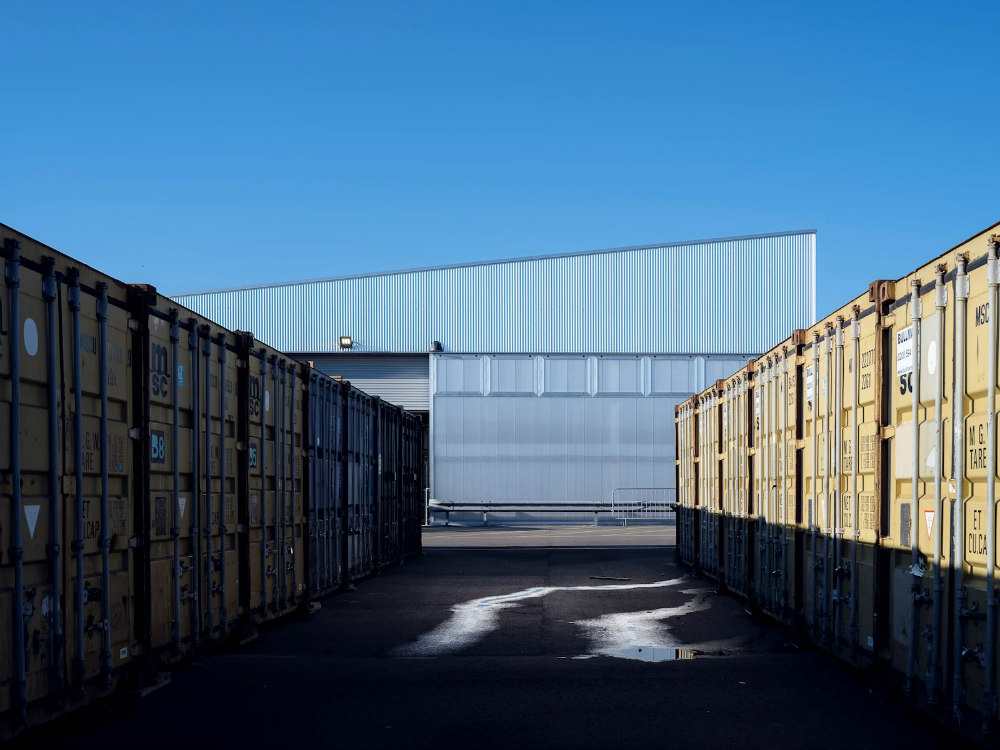
I asked Parra what would be the scenario if I decide to buy, let’s say, a chair from a neighbour manufacturing it at Bloqs instead of buying one from a store using mass production. And he replies “that is why the application of technology is so important. That chair will cost you more because it is made by hand. However, your neighbour would start to be as competitive if he would be able to afford the access to use the proper technology such as we offer access to.”
Bloqs keep prices affordable so their members can make profit and grow. For that purpose, it runs as a not-for-private-profit social enterprise. The surplus goes to “investing in machinery, improving services, diversifying capacity, and working for the future of all makers.” Parra talks of grassroots manufacturing to ultimately drive change in their city and beyond.
We agree that the importance of their work is not reflected in their website. “We threw the pendulum too far and we didn’t engage with the intellectual discussion,” admits Parra. But I see that the imperative behind Bloqs is environmental and more than just economic. Behind his idea of manufacturing redistribution, there seem to be three key motives.
The first and most obvious one is that “we have to manufacture where we are. Not only to reduce the carbon footprint of transportation, but most importantly, it would make us more conscious about our environmental impact. If we started producing pollution in our cities, it would accelerate the new technologies that would make urban manufacturing quieter and less polluting. Instead we have chosen to look the other way and outsource our pollution to China.”
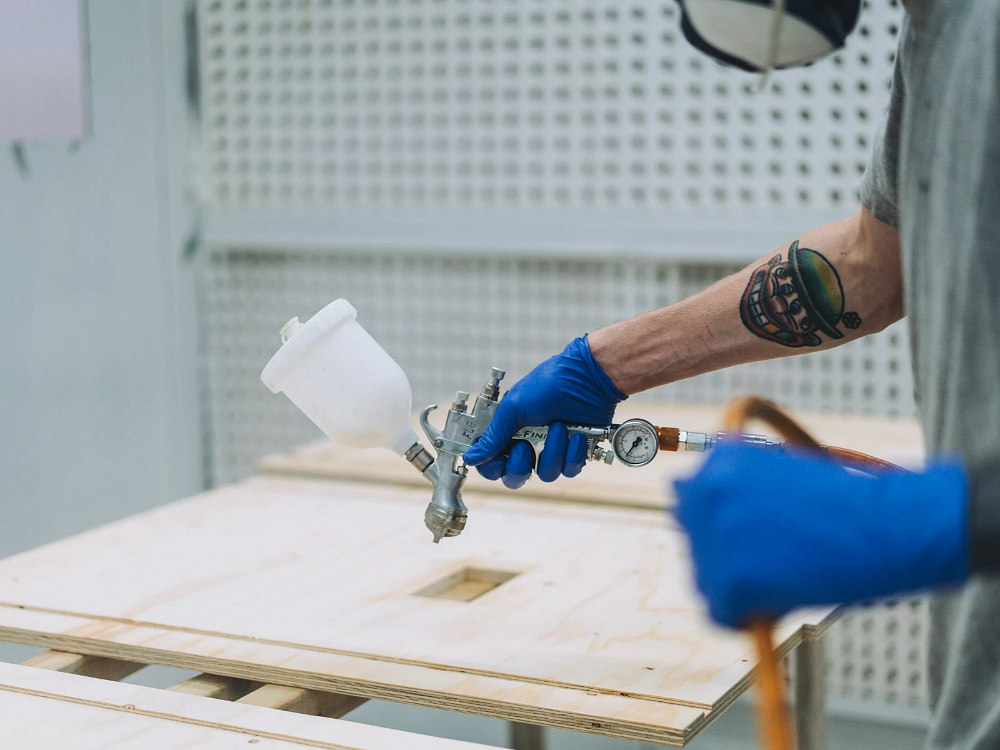
Secondly, “redistributing manufacturing requires circularity. The world demands right now that we use resources much more wisely and we see Bloqs as part of the discussion. We absolutely must fight against the excesses of mass production and built in obsolescence,” says Parra. “We know that if we build powerful networks, we stand a better chance of surviving when difficult times come.” There are already many signs that point to why the circular economy could work better at a city scale, thereby fostering urban resilience and self-sufficiency in the urban environment.
This chimes with what some researchers have been arguing in the project Cities of Making: “co-location of consumption and production activities increases the traceability of products and processes, promoting the adoption of cleaner technologies. And “keeping a productive sector in cities helps to maintain a skills base and promote activities which maintain the value of resources, such as repair and re-manufacturing services and it is connected to the development of digital and technologies adapted to the city’s socio-economic fabric.”
Redistributing manufacturing requires circularity. The world demands right now that we use resources much more wisely and we see Bloqs as part of the discussion.
Climate change is not the only driving force for redistributing manufacturing; fighting poverty is also contributing to this contest. Urban manufacturing could address the general concern in cities about the decreasing trend of skilled workers and high unemployment, especially among young people. In Enfield council’s eyes, Bloqs plays a crucial role in fostering a local economy in North London. The impact of Bloqs is completely visible and the social capital of nurturing manufacturing is incontrovertible. The membership community has over 700 active members with a turnover of approximately 15 million pounds per year, a number quite conservative given the growth Bloqs expects through the collaboration with companies for further education to encourage vocational qualification and skills in young people entering creative professions.

“There are a number of institutions which consider us their outsourced technical campus. We have run a pilot project and many students came through Bloqs during one year. And that was just promoting one institution which has sent its teachers to our facilities for free classes. In addition, our team is prepared to deliver a curriculum for mechanical engineering colleges.”
Currently, over 700 businesses use Bloqs. If all these businesses would have their own spaces, with their own investment in machinery, the carbon and physical footprint in the city would have been enormous. Parra predicts that more businesses will join Bloqs, yet the return of manufacturing to urban centres will not happen overnight. It will also require consumer behaviour that takes time to change. As the CEO of Brompton bikes, who advocates for production in London, put it once for another media outlet: “People have no idea what goes into a product. That’s not a good thing. We have a climate crisis. We forget how powerful the consumer is […] Showcasing engineering, he hopes, will help attract “the best brains . . . solving the world’s problems”.
Parra goes back to 2012 when the idea for Bloqs sparked. As we were building the concept model, there was already a community of need for resources which we didn’t innovate, and we didn’t innovate the kind of machines in our spaces either. It is the interface between the community that was innovation, and what has made the resources accessible and democratically available to everyone. Nichols, one of the co-founders, knew if they put a rich environment together with a dynamic network, something amazing would spring from it. Innovation and invention are intrinsic human aspects, but “if we can put technology in the hands of the creative minds, then we can create a place where people can innovate the problems of the future.”
The arrival of urban manufacturing could be seen as a historical and technological turning point, akin to the industrial revolution. But part of the problem is that, currently, manufacturing is about competing rather than collaborating. And, for now, this race is being driven by profit. The founders at the front of Bloqs are surely spearheading a movement and it is difficult to tell how far away in the future this development might be. But these individuals are gifted with a vision of how urban manufacturing could be hugely positive for humanity.
